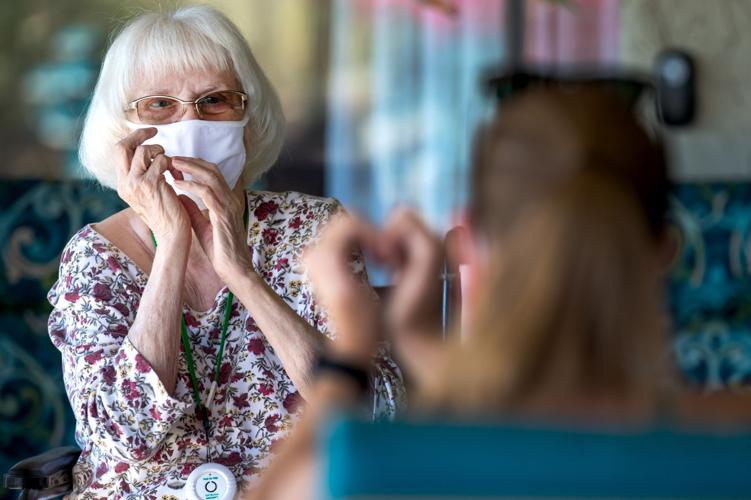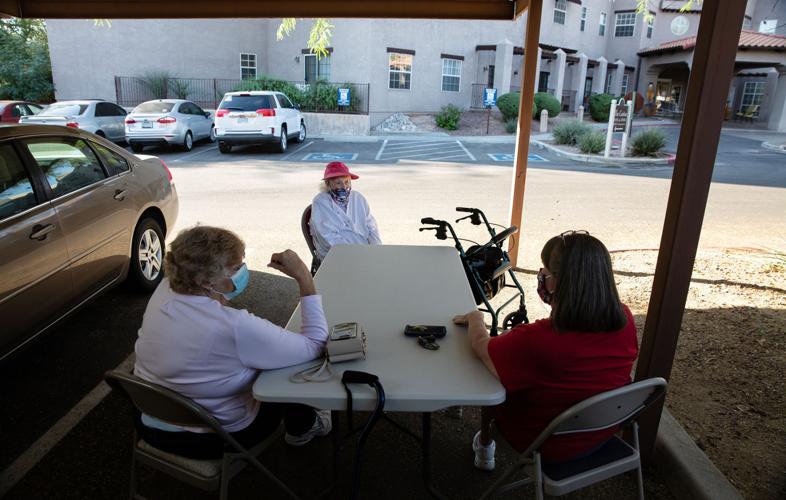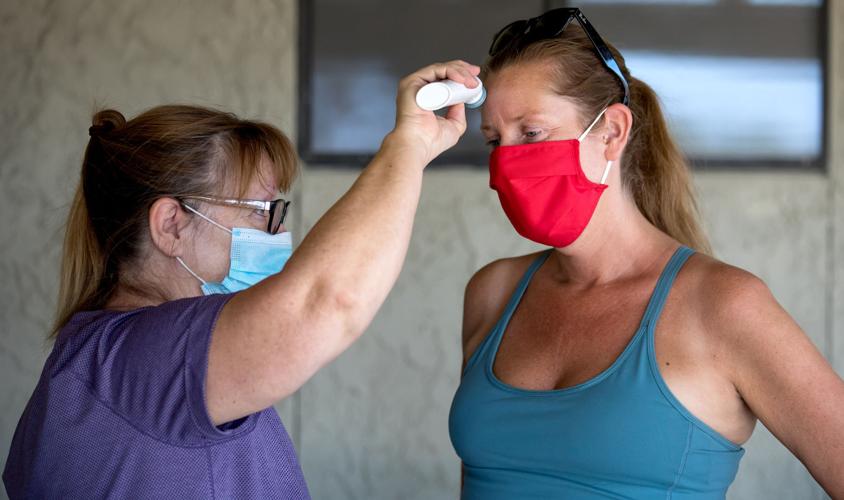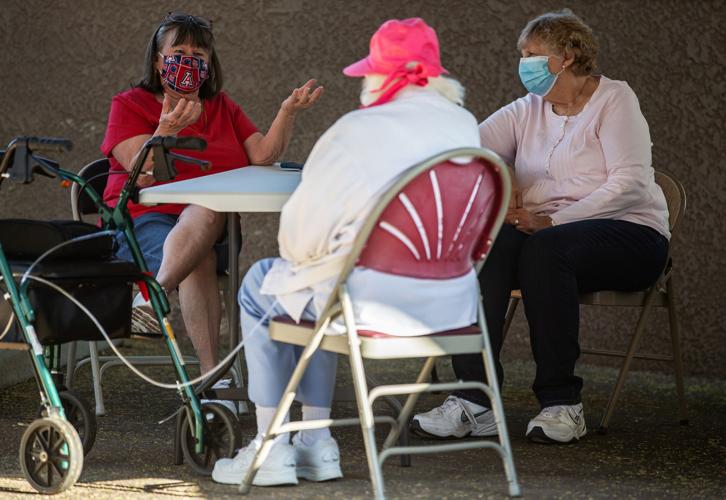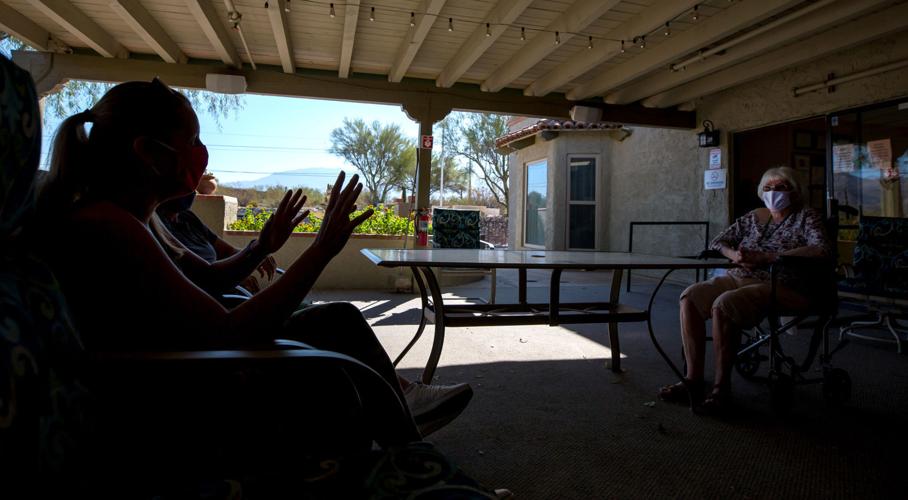There are smiles, tears and laughs. There are feelings of peace and a calmness as spouses, daughters, sons, grandchildren and great-grandchildren are among those visiting their loved ones after some seven months of not being physically near them.
These are the emotions families are experiencing as they are being allowed back into assisted living, senior communities and long-term-care facilities after months of only telephone calls and Zoom or FaceTime encounters with their elderly family members.
There are still strict protocols — including wearing masks, remaining 6 feet apart, no touching, temperature-taking, questions about travel and overall health, and frequent cleaning of the designated areas for outdoor and indoor visits.
Most visitors are doing outdoor visits because they feel it is safer for their medically vulnerable loved one, said administrators of facilities.
Sean Bennett, president of Assisted Living Network of Southern Arizona, agreed with administrators. “Families rather error on the side of precaution and be sure their loved one stays safe,” said Bennett, adding that those in hospice have been allowed to have relatives visit to say their goodbyes for the most part during the pandemic.
However, many families are continuing their visits through the internet and the telephone because they want to make sure they do not bring any illnesses to the facilities, said Bennett of the network that represents about 400 members and 40 care homes in Southern Arizona.
Visit requirements
For those doing indoor visits, the visitor must take a COVID-19 exam and a written negative result must come back within 48 hours before the visit. The visitor must also attest that they remained in self-isolation during the 48 hours before they are allowed into the facility.
The numbers of those visiting remain low for indoor and outdoor visits, administrators of facilities said recently. For most, the visits began several weeks ago.
The Tucson assisted living and dementia care facility Sunrise at River Road also allows visitors to take their loved one off the facility for up to 12 hours, and the outing must include social-distancing, masks, no touching and temperature readings before and after the visit. Once the resident returns, they are put in quarantine and must pass two COVID-19 tests before they are allowed out of their room. Since June, Sunrise at River Road began COVID-19 testing of residents and staffers every two weeks and have had no cases.
Since coronavirus cases remain so fluid in terms of the risk of community spread, the Arizona Department of Health Services established benchmarks and facilities can restrict or shut down visitations when necessary. The benchmarks — minimal, moderate or substantial community spread — look at the number of cases per 100,000 residents, the percent of tests for the virus that come back positive, and the percent of patients showing up in hospital emergency rooms with COVID-like symptoms.
Several families and residents shared their experiences visiting with loved ones at long-term-care facilities. The following are their stories.
Elderhaven Assisted Living
Eli Hyland patiently waits for her daughter to come visit her each week in an outdoor patio at Elderhaven Assisted Living, a private home that sits on 5 acres on Tucson’s northeast Foothills area. Hyland, 78, had mini-strokes beginning eight years ago. She is paralyzed on her right side and was moved in June from a large independent facility to Elderhaven for more personalized care.
“The strokes severed the line that moves her thoughts to her mouth,” explained her daughter Karen Shea, a property management consultant. “She is totally cognitive but cannot express her thoughts verbally. Occasionally, she can say yes or no,” said Shea, treasuring the visits with her mother.
“My mother is fascinating and is a strong woman,” said the daughter who recalled her growing up on a dairy farm near Trondheim in Norway that is still functioning and remains in the family. Hyland was a toddler when she lost three fingers in a fan motor at the farm and was taken by her parents to a hospital more than a mile away.
She was a former hospital pediatric nurse in Norway before moving to the United States at age 26 in 1968. She fell in love with a Chicago doctor while he was doing his residency at the hospital. They married and moved to Tucson, where he worked in private practice. After Hyland’s two children were grown, she returned to college and received a bachelor’s degree from the University of Arizona in the 1990s. She majored in counseling and worked in social services with sexually abused children until she retired in 2008.
“She is amazing,” said Shea about her mother, who has a head full of silver hair, blue eyes and an endearing smile. “I love her so much. She taught me patience, kindness, and to love people for who they are and not what they are,” said Shea, recalling going with her mother on volunteer visits to homeless shelters and facilities for residents with severe cognitive impairments. “I learned to do community service from her at a young age,” said Shea.
Shea said the months of telephone calls and only seeing Hyland through a window are different now. The two sit across from each other practicing social-distancing, wearing masks and enjoy the fresh air and chirping of birds in a patio. Shea said she prefers the outdoor visits because the elderly are the most vulnerable. She said she accepts the abundance of caution because it is warranted, and her older brother, Eric Hyland, a classical trumpet player with the National Symphony Orchestra of Mexico, has hope he and his family will be able to travel from Mexico City to visit Hyland next year.
“I feel relief, happiness and joy just knowing she is so much more at peace and happy living at Elderhaven,” said Shea of her mother. “She is calmer and less anxious. She is in good hands,” said Shea, who cried on the ride home after seeing her mother recently.
Alexandria “Zan” Dobyns, owner of Elderhaven, which houses up to 10 residents, said at this point she is allowing only outdoor visits, unless relatives want to see their loved ones in hospice.
So far, families cannot meet the criteria for indoor visits because it is difficult getting written proof of their negative COVID-19 tests within 48 hours before the visit, explained Dobyns. She said the written verification of the test result can easily take more than a week. Outdoor visits at Elderhaven began last month.
“Our home has had no residents or staff with an active coronavirus case. Our house has been very safe,” said Dobyns of the home that also cares for those with dementia.
However, there has been sadness at Elderhaven. “I had so many people, some of my more healthy residents pass, and I truly believe that it was the isolation that killed them,” Dobyns said. “The isolation was as deadly as the disease.”
Nine residents — ages 76 to 99 — passed away between March and July because their health declined during isolation and they went into a depression, said Dobyns. “They lost their will to live.”
Before coronavirus, residents socialized with one another and saw each other as family. There were parties, potluck dinners, bingo gatherings, holiday decorating, food festivals and friends and relatives would come visit. The family atmosphere among residents has returned with communal dining, bingo games and Halloween decorating since there have been no coronavirus outbreaks at the home, said Dobyns, a retired interior designer who returned to work in the assisted living industry over a year ago.
Being around other residents has made a big difference for Marilyn Linderkamp, 89, and her husband Eugene, 91. The couple moved from Minneapolis to Tucson in 2006 after spending six winters here as snowbirds. Marilyn is a retired teacher and Eugene, who served in the Navy during the Korean War, retired from an electronics company.
The couple lived in their east-side home until earlier this year when they suffered illnesses that sent both of them to rehabilitation centers. When they were discharged months ago, the Linderkamps moved into Elderhaven. They were in isolation and not doing well. “Isolation is hard. Some people get so tired and are sick and give up,” said Marilyn.
But she said she and Eugene slowly regained their strength, leaned on their faith and spoke to relatives on the telephone or through FaceTime. A highlight, said Eugene, was seeing his granddaughter’s wedding livestreamed from a mountain home near Colorado Springs where the groom had just graduated from the Air Force Academy. The Linderkamps said they remain in good spirits and enjoy visitors from their church in the outdoor patio.
The Fountains at La Cholla
Irene Seefeld is 95 years old and outlived two husbands. The retired secretary who worked for doctors in private practice was living independently in Prescott Valley until two years ago when she moved into an assisted living senior community. She then decided to move closer to family in Tucson and made the Fountains at La Cholla her home a year ago.
She lives in a studio apartment at the northwest-side facility on spacious grounds with lawns and gardens filled with colorful flowers and shade trees. Seefeld suffers from high blood pressure and COPD, or chronic obstructive pulmonary disease. She is legally blind because of macular degeneration and receives daily assistance from the staff.
Seefeld’s daughter, Judy Biggs, a retired corporate executive assistant, and Seefeld’s daughter-in-law, Cindy Samsel, have frequent outdoor visits with Seefeld under a carport near her apartment where they enjoy the gardens at the senior community.
The women enjoy the visits and storytelling — even if they cannot hug — and must abide by strict protocols for their safety and the safety of the residents and staff during the pandemic.
Before each outdoor visit, temperatures are taken and a series of questions regarding travel, and if Biggs or Samsel are experiencing coronavirus symptoms must be answered. Both women said they remain isolated in their homes to prevent getting ill so they can visit with Seefeld.
The outdoor visits began three weeks ago. “It was wonderful for mom, myself and my sister-in-law,” said Biggs, adding that her mother lost about 15 pounds since March when the isolation of residents began. Biggs said the last family visit was on Mother’s Day when the family saw Seefeld through closed glass doors, placing their hands on the glass to meet with Seefeld’s hands. “It was just fantastic,” said Biggs, recalling tears and her mother’s excitement when she spoke to her afterward on the telephone. Telephone calls keep Seefeld close to her relatives in Iowa and Missouri as Biggs catches her up on family news.
Before the pandemic, Seefeld would spend nights at her daughter’s house where all the family would gather for Thanksgiving, Christmas, New Year’s and other holidays and festive occasions.
Biggs enjoys sharing stories about her mother’s life and hopes the stories will help her mother in recalling long-term memories. Seefeld was born and reared in the farming community of Rockwell City, Iowa, where generations of her family continue planting corn and soybeans. She came to Tucson at age 19 in 1944 to care for an aunt who was ill. She went to work at a doctor’s office and met her first husband, Alex Samsel, a carpenter, who she married in 1947. They raised two children and Samsel died in 1972. Three years later she married Robert Seefeld, a salesman, and he died in 1997.
Seefeld leaned on her children and their families and was never alone. She also found comfort in her Lutheran faith. She enjoyed life, travel and foods. Fried shrimp is one of her favorite dishes and she gets her fill on weekends when her son, Michael Samsel, and his wife, Cindy, leave shrimp for her with the Fountains’ front-desk staff.
Seefeld is eating more now and is calm, happy and her memory appears to be improving, said Biggs. She has not had her white-grayish hair cut or permed since March and is excited for the salon at the Fountains to open.
“She is venturing out of her apartment more now and likes to sit outdoors. I am pleased with the staff and nurses here. She is in good hands,” said Cindy Samsel.
The Fountains at La Cholla is one of four Watermark Retirement Communities operated in the Tucson area offering independent living, assisted living, memory care and hospice care.
Merri Miller, a member of Watermark’s COVID-19 Task Force, said indoor and outdoor visitation of residents are both available at the Fountains and at the Watermark at Continental Ranch, the Hacienda at the Canyon and the Hacienda at the River.


